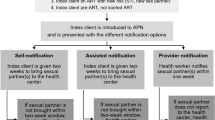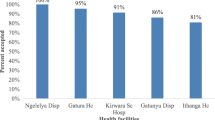Abstract
The challenges of dealing with disclosure of HIV status cause frustration to health care providers and counselors. This frustration follows from the already known high risk to the third party on one hand and our ethical obligation to “respect persons” in terms of privacy and confidentiality on the other side. Given the stubbornly low rates of voluntary disclosure (partner notification) among couples, however, it is quite tempting to suggest a paradigm of routine third party disclosure to identifiable sexual partners by health care providers. This might be the lesser of the two evils and might give better public health outcomes in the fight against HIV/AIDS in Sub-Saharan Africa.
Similar content being viewed by others
References
Stuart, Rennie, et al. 2006. Desperately seeking targets: the ethics of routine HIV testing in low-income countries. Bulletin for the World Health Organization 84: 52–57.
Botswana Networld on Ethics, Law, HIV/AIDS (BONELA). 2003. Event report: Routine versus compulsory test. http://www.bonela.co.bw/Reports/SeminarReport. Accessed 27 Nov 2005.
Beauchamp, T., and J. Childress. 1994. Principles of biomedical ethics. New York: Oxford University Press.
Soyinka, F. 2007. Phyiscian’s dilemma in the management of HIV/AIDS in Africa. IN CODESRIA, CLNS, ORSTOM international symposium of social science and AIDS in Africa. www.codesria.org/links/publications/aids/soyinka. Accessed 6 Nov 2007.
Nwanma, Vincent. 2005. In AIDS fight, men make a difference (Campaigns in Africa seek to change male behavior): Silence no more, Africa fights AIDS. New York, Africa Renewal, U.N. Department of Public Information.
World Health Organization. 2003. The right to know: New approaches to HIV testing and counseling. http://www.who.int/hiv/ev. Accessed 3 Oct 2008.
Kirungi, Fred. 2005. Uganda beating back AIDS, leadership, education and openness are keys to progress: Silence no more, Africa fights AIDS. New York: Africa Renewal, U.N. Department of Public information.
Malawi Law Commission. (2007). Report of the Malawi Law Commission on the development of HIV and AIDS legislation.
The Malawi National HIV/AIDS Policy. June (2003). http://www.ilo.org/public/english/protection/trav/aids/laws/malawi1.pdf. Accessed 6 Nov 2007.
Kadida, Jillo. 2005. Daily Nation, Nairobi Kenya, 14 July.
Office of the United Nations High Commissioner for Human Rights and the Joint United Nations Programme on HIV/AIDS. 2007. International Guidelines on HIV/AIDS and Human Rights. http://data.unaids.org/Publications/IRC-pub07/jc1252-internguidelines_en.pdf. Accessed 6 Nov 2007.
Rothenberg, Karen, and Stephen Paskey. 1995. The risk of domestic violence and women with HIV infection: Implications for partner notification, public policy, and law. American Journal of Public Health 85 (11): 1569–1576.
Council for International Organizations of Medical Sciences. 2002. International ethical guidelines for biomedical research involving human subjects. Geneva.
Elliot, Richard, and Mirriam Maluwa. 2002. Criminal Law, public health and HIV transmission: A policy options paper prepared for a joint United Nations Programme on HIV/AIDS. http://data.unaids.org/publications/IRC-pub02/JC733-CriminalLaw_en.pdf. Accessed 3 Oct 2008.
Susan, Allen, et al. 2003. Sexual behavior of HIV discordant couples after HIV counseling and testing. Official Journal of the International Aids Society 17 (5): 733–740.
Author information
Authors and Affiliations
Corresponding author
Rights and permissions
About this article
Cite this article
Masiye, F., Ssekubugu, R. Routine third party disclosure of HIV results to identifiable sexual partners in Sub-Saharan Africa. Theor Med Bioeth 29, 341–348 (2008). https://doi.org/10.1007/s11017-008-9085-x
Published:
Issue Date:
DOI: https://doi.org/10.1007/s11017-008-9085-x




